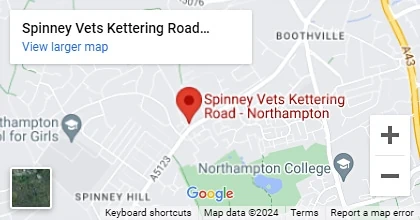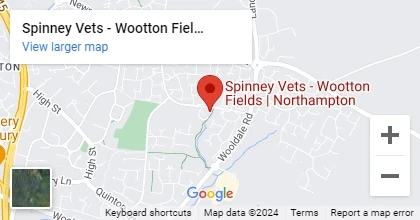Neutering your pet is one of the most responsible and caring decisions you can make for your pet’s health and well-being. Whether you have a new puppy or kitten at home in Northampton or a slightly older pet, neutering is essential for ensuring that your pet has a long and healthy life.
Pet Neutering is a surgical procedure performed under general anaesthesia to remove part or all of an animal’s reproductive organs, preventing them from reproducing. In males, it is called castration and in females, spaying. At Spinney Vets in Northampton, we boast a compassionate and attentive team of experienced veterinary surgeons and registered veterinary nurses along with the best facilities to ensure your pets receive exceptional care during their neutering procedure.
Why Should I Neuter My Pet?
Neutering your pet is a responsible decision that has tremendous health benefits for your furry friend. Not only does it help control the pet population by preventing unplanned litters, but neutering can also lower the risk of certain cancers and prevent reproductive-related health issues. Pet neutering has also been proven to reduce undesirable behaviours such as roaming, aggression, and urine marking in males. By neutering your pet, you're not only ensuring their prolonged health and well-being, but you’ll also be having a positive impact on the wider community.

What Are The Benefits Of Pet Neutering?
Preventing Unwanted Pregnancies:
- Female pets undergo spaying, which involves removing the womb and ovaries, and are consequently safeguarded from unwanted pregnancies.
- Meanwhile, male pets undergo castration, the removal of the testes, which prevents them from impregnating females.
Health Benefits:
- Spaying females not only prevents unwanted pregnancies but also significantly reduces the risk of uterus infections and certain cancers.
- Castrating males meanwhile decreases the chance of your pet developing testicular cancer.
Improving Behaviour:
- Neutering male dogs and cats results in reduced urine-marking and roaming behaviour.
- For rabbits, Neutering is likely to induce calmness and make them much less likely to fight each other or show aggression towards people.
Avoiding Mess and Birth Defects:
- Unspayed female animals often experience messy heat cycles, which can last up to three weeks.
- Meanwhile, neutering can prevent sibling-mating which often results in birth defects and deformities.
When Should I Neuter My Pet?
Dog neutering is usually carried out at around six months of age for males and pre-season for female dogs, reducing the likelihood of females developing mammary cancer. However, we will also take into account your dog’s breed, size, overall behaviour, and other risk factors to provide the most suitable recommendation based on the available information.
Meanwhile, Cat neutering is usually carried out at around four months old, after they have completed their primary vaccinations. For rabbits, neutering usually takes place at 12 weeks of age for males and 16 weeks for females.

Is Pet Neutering Painful?
Neutering is carried out under general anaesthesia, ensuring your pet doesn’t feel any pain during the surgery. Post-surgery, medication will also be given to your pet to alleviate any discomfort. Recovery time varies, but most pets will be back to normal within a few days. With our dedicated team of experienced veterinary surgeons, you can rest assured that your pets will receive only the best care and attention at Spinney Vets.







